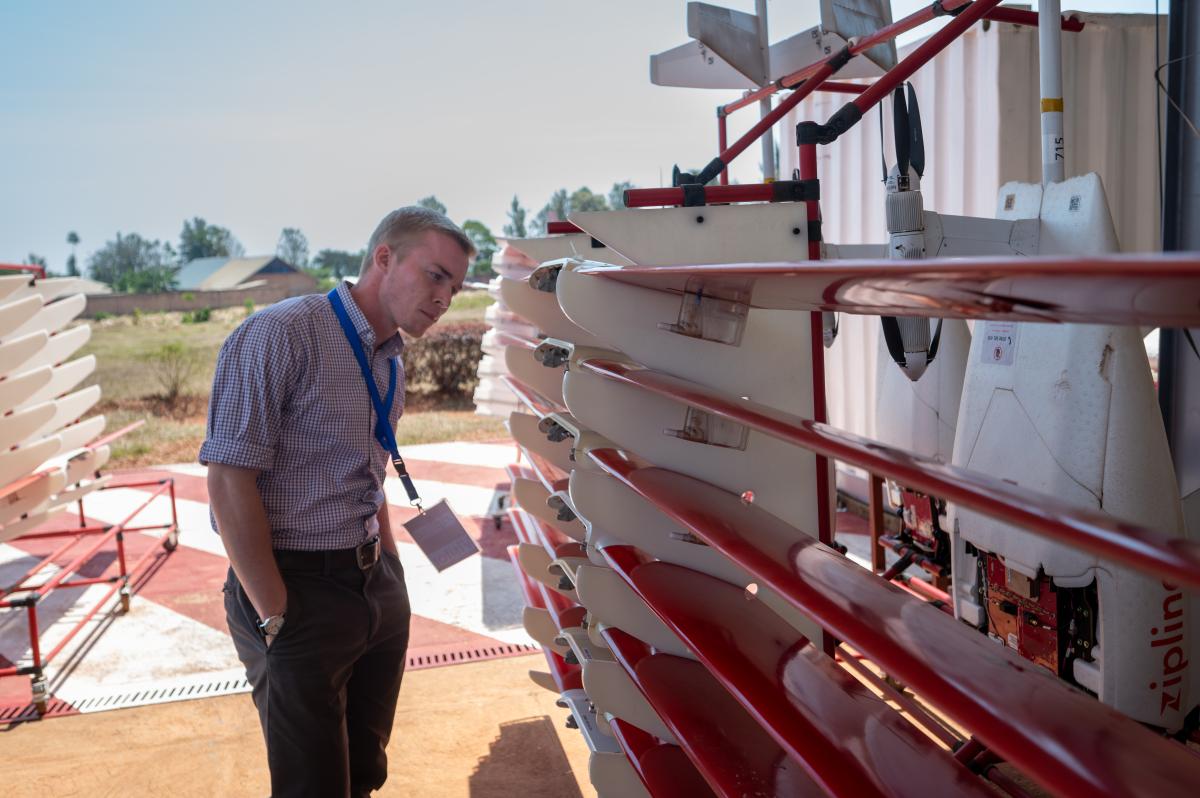It was Miles Listerman’s sweet tooth that led him to the Kigali Summer Institute.
The junior business administration major from Hartville, Ohio, heard about the education-abroad experience because he had class in Bowman Hall near the College of Arts and Sciences’ Office of Global Education, and often would stop by to raid the office’s candy jar.
One day, Kristin Stasiowski, Ph.D., assistant dean of international programs and education abroad for the college, asked him if he had ever considered studying abroad.
“I told her, ‘I don’t know anything about it.’ She put me on to the trip and inspired me to join,” he said.

Never having been out of the country before, Listerman said he thought about a trip to Europe but decided on something more exotic. “As wonderful as Europe sounds, I wanted to go somewhere totally different, I wanted something more off the beaten path.”
He left for Rwanda in July with an open mind, looking forward to experiencing a new culture, and came home with a full heart.
¬È∂πæ´—° has offered the education-abroad course, Rwanda After the Genocide Against the Tutsi, since 2019. Known as the Kigali Summer Institute, the course takes place over three weeks in Rwanda in July.

Developed and taught by Sarah Schmidt, Ph.D., an instructor in the School of Peace and Conflict Studies and assistant director of global education initiatives at ¬È∂πæ´—° at Stark, the study trip explores the post-genocide reconstruction of Rwanda and issues related to peace and conflict in the context of the country‚Äôs history.
This year’s class included students from a variety of majors, both graduate and undergraduate; Listerman was the only business major.
“I know that in the world of business, there’s a lot of tension. There’s a lot of just pure dollars and cents. What are we going to make? How can we cut costs?” Listerman said. “I think especially after experiencing the Kigali Summer Institute, I’m going to take a more ethical approach to business standards. I want to take a lead in whatever company I’m in. I want to take a lead in the company’s ethics and practices and understand that it’s not just a quota, it’s not just a production cost. There’s the humanity behind it and also our social responsibility. What can the company do to improve not only our local community but even the worldwide community.”
from on .
Listerman who lives at home in Hartville, Ohio, and commutes to the Kent Campus, knows that he wants to remain in northeast Ohio after graduation, but he signed up for the trip because he was ready to see the world.
“Hartville is an Ohio farming town. There’s nothing wrong with that, but I know that there’s more to the earth than that,” he said. “I want to build and grow in cultural knowledge.”
In Rwanda, Listerman was interested to see how the education system compares to the U.S., and he hoped to gain knowledge that he could bring back and share with his peers.

“I want[ed] to learn how the country has not just endured, but improved,” he said. “The genocide was within our recent history. How have they improved and grown stronger from such a terrible event?”
As part of the course, students visited a reconciliation village, where victims of the genocide – those who saw their families slaughtered or were subjected to violent acts – live alongside perpetrators of the violence.
“It was just an extremely powerful experience to see. But it was also helpful (to see) how people could have faith and optimism in another person and see the humanity behind (the person) whether it be a perpetrator or a survivor, that they saw the humanity in one another,” Listerman said.

One of his favorite classes to date has been a conflict management class in the School of Peace and Conflict Studies, and he hopes to be able to apply what he learned there in the future, particularly knowing how “to separate the person from the problem.” His instructor was a native of Jordan, and Listerman said he was impressed by his thought process, patience and conflict management skills.
When Listerman learned that the Kigali Summer Institute included attendance at “Peace Education in an Ear of Crisis,” a global peace conference sponsored by Kent State’s School of Peace and Conflict Studies and others, that sealed the deal for him signing up.
“It was inspiring to see so many people collected and gathered for peace and conflict management skills. It was really, really a wonderful thing to see,” he said.

Listerman started out majoring in aeronautics, but after earning his pilot’s license, switched his major to business, because it more closely aligned with his interest in the shipping and logistics side of commercial aviation.
“I would like to go into the shipping and logistics side of the industry,” he said, “I’m a big nerd about that.” In addition to a full load of classes, Listerman works full-time at the Akron-Canton Regional Airport, in corporate aviation as a marshal who fuels and signals planes. At one point, he had to take time off from school to work and save money, but he did not mind. “I’m here for the education, so if it takes a while, it takes a while,” he said.
The Rwanda trip allowed him to visit the Rwanda Development Board, which oversees the private sector economy in the country. ‚ÄúIt really kind of tied in what I learned at ¬È∂πæ´—°with real-world practices, which was excellent to see, especially how the country has progressed post-genocide.‚Äù
The trip also included a visit to Zipline, a drone delivery and logistics company based in Rwanda.

Photo credit: Bob Christy/Kent State

